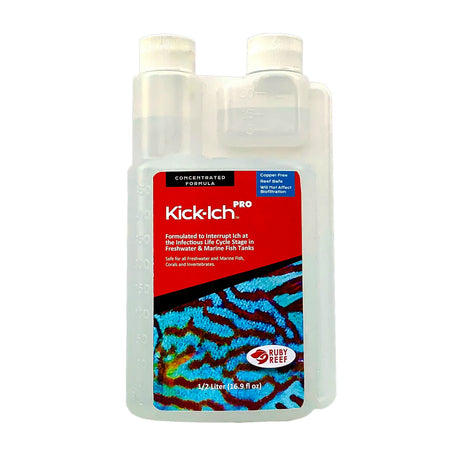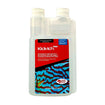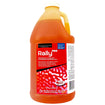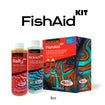- No products in the cart.
Ich Treatment for Marine Aquariums That Doesn't Harm Reefs
30
Sep
Keeping a reef aquarium can be incredibly rewarding, but it also comes with its challenges. One of the most common problems saltwater aquarium owners face is ich, a parasitic infection that can quickly spread and devastate fish populations. In reef tanks, treating ich presents a unique problem—many medications that effectively treat the parasite can be harmful to corals, invertebrates, and other sensitive reef inhabitants. That’s where reef safe ich treatment becomes essential.
In this blog, we'll explore what ich is, why it’s so problematic in reef tanks, and how to use reef-safe treatments to manage ich outbreaks without endangering the delicate ecosystem of your tank.
What is Ich?
Ich, also known as "white spot disease," is caused by the parasite Cryptocaryon irritans in saltwater fish. It appears as white spots on the body, fins, and gills of infected fish, and can cause symptoms such as rapid breathing, scratching against objects, loss of appetite, and lethargy. If left untreated, ich can cause serious damage to fish, leading to death in severe cases.
Ich can be particularly troubling in a reef tank because it’s highly contagious. If one fish is infected, it can quickly spread to the rest of the population. Additionally, fish that are stressed, either due to water conditions or other factors, are more susceptible to the disease.
Why Traditional Ich Treatments Can Be Harmful to Reef Tanks
The most common treatments for ich in saltwater fish are copper-based medications and chemicals like formaldehyde. These treatments can be highly effective at killing the ich parasite, but they come with a major drawback: they are toxic to many of the inhabitants of a reef tank.
Corals, invertebrates like shrimp and snails, and other sensitive organisms in your reef ecosystem can be harmed or even killed by traditional ich treatments. Using these medications in a reef tank can lead to unintentional destruction of the delicate balance of life that makes a reef so vibrant.
The Need for Reef Safe Ich Treatment
Since traditional ich treatments are not suitable for reef tanks, aquarium hobbyists need to find reef safe ich treatment options. These treatments are designed to target the ich parasite while leaving corals, invertebrates, and other reef inhabitants unharmed.
The key to reef-safe ich treatments is their gentle formulation, which specifically targets the parasite without affecting the rest of the ecosystem. Reef-safe treatments are typically made from natural ingredients or use alternative chemical compositions that are non-toxic to sensitive marine life.
Top Reef Safe Ich Treatment Options
Here are some of the best reef safe ich treatment options available for saltwater aquariums:
- Herbal and Natural Ich Treatments
Many reef-safe ich treatments are made from herbal extracts and natural ingredients. These treatments are designed to boost the fish’s immune system and create an inhospitable environment for the ich parasite without using harsh chemicals. Products like Herbtana and EcoReef Ich Shield use this approach.
These natural treatments can be added directly to the tank and are generally safe for corals and invertebrates. However, they may not be as fast-acting as chemical treatments and may require repeated dosing to effectively clear an ich outbreak.
- UV Sterilizers
Another reef-safe way to manage ich in a reef tank is through the use of a UV sterilizer. UV sterilizers work by passing water through a chamber that contains a UV light. This light kills free-floating parasites, including ich, in the water column.
While UV sterilizers won’t cure fish that are already infected, they can help prevent the ich parasite from spreading to other fish in the tank. This method is entirely reef-safe since it doesn’t involve adding any chemicals to the water.
- Hyposalinity Treatment
Hyposalinity, or reducing the salinity of the aquarium water, is a reef-safe method for treating ich in fish-only tanks. Unfortunately, this method is not entirely safe for corals, but it can be used in fish quarantine tanks. In this treatment, the salinity is lowered to about 1.009 specific gravity over a period of time, which stresses and kills the ich parasite while allowing the fish to recover.
If you’re able to remove the infected fish from the reef tank and treat them in a separate quarantine tank, hyposalinity can be a very effective and natural way to treat ich.
- Medicated Reef Safe Treatments
There are also some chemical-based treatments that are specifically designed to be safe for reef tanks. Products like Ruby Reef Rally and PolypLab Medic are formulated to kill ich without harming corals or invertebrates.
These treatments often work by targeting the free-swimming stage of the ich parasite’s life cycle, preventing it from re-infecting the fish. They are relatively easy to use and can be added directly to the display tank, making them a convenient option for reef tank owners.
How to Use Reef Safe Ich Treatments Effectively
Using reef safe ich treatment is a great option, but it’s important to apply it correctly to ensure its effectiveness. Here’s how to make sure your treatment works properly:
- Quarantine New Fish
One of the best ways to prevent ich outbreaks is by quarantining new fish before adding them to your reef tank. This will give you time to observe the fish for any signs of illness and treat them if necessary before they come into contact with your main tank’s inhabitants.
- Maintain Stable Water Quality
Fish that are stressed by poor water conditions are more likely to get sick. Keeping water parameters stable—such as temperature, salinity, pH, and ammonia levels—will help reduce stress and prevent ich outbreaks. Regular water changes and monitoring water quality are key to maintaining a healthy tank.
- Observe Early Symptoms
The earlier you catch an ich outbreak, the easier it is to treat. Regularly observing your fish for signs of illness—such as scratching, rapid breathing, or the appearance of white spots—will allow you to act quickly and stop the parasite from spreading.
- Follow Dosage Instructions
If using a reef-safe ich treatment, it’s important to follow the manufacturer’s dosage instructions carefully. Overdosing can be harmful to your fish and corals, while under-dosing may not fully eliminate the parasite.
Conclusion
Managing ich in a reef tank requires careful consideration to ensure the safety of all its inhabitants. Traditional ich treatments, while effective, can be harmful to corals and invertebrates. Luckily, reef-safe ich treatments offer a solution that targets the ich parasite while preserving the delicate ecosystem of your reef tank.






